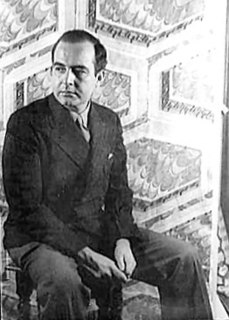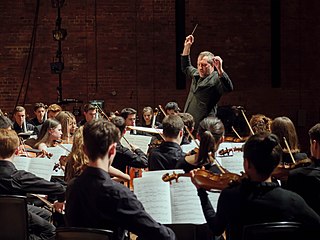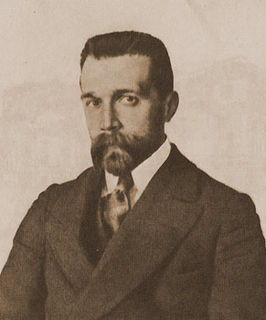Walter Taieb (born February 13, 1973 in Paris, France) is a French record producer, songwriter, composer and conductor.
Walter Taieb (born February 13, 1973 in Paris, France) is a French record producer, songwriter, composer and conductor.
In the mid-1990s, Taieb was a member of the house music group the Original, which scored a hit single in 1995 with "I Luv U Baby".
Taieb is the composer of The Alchemist's Symphony [1] [2] with Juilliard professor Philip Lasser (1997). He studied conducting with Rolf Reuter in Berlin.

A symphony is an extended musical composition in Western classical music, most often for orchestra. Although the term has had many meanings from its origins in the ancient Greek era, by the late 18th century the word had taken on the meaning common today: a work usually consisting of multiple distinct sections or movements, often four, with the first movement in sonata form. Symphonies are almost always scored for an orchestra consisting of a string section, brass, woodwind, and percussion instruments which altogether number about 30 to 100 musicians. Symphonies are notated in a musical score, which contains all the instrument parts. Orchestral musicians play from parts which contain just the notated music for their own instrument. Some symphonies also contain vocal parts.

The Symphony No. 9 in E minor, "From the New World", Op. 95, B. 178, popularly known as the New World Symphony, was composed by Antonín Dvořák in 1893 while he was the director of the National Conservatory of Music of America from 1892 to 1895. It premiered in New York City on 16 December 1893. It has been described as one of the most popular of all symphonies. In older literature and recordings, this symphony was – as for its first publication – numbered as Symphony No. 5. Astronaut Neil Armstrong took a tape recording of the New World Symphony along during the Apollo 11 mission, the first Moon landing, in 1969. The symphony was completed in the building that now houses the Bily Clocks Museum in Spillville, Iowa.

Samuel Osmond Barber II was an American composer, pianist, conductor, baritone, and music educator, and one of the most celebrated composers of the 20th century. The music critic Donal Henahan stated, "Probably no other American composer has ever enjoyed such early, such persistent and such long-lasting acclaim." Principally influenced by nine years of composition studies with Rosario Scalero at the Curtis Institute and more than twenty-five years of study with his uncle, the composer Sidney Homer, Barber's music usually eschewed the experimental trends of musical modernism in favor of utilizing traditional 19th-century harmonic language and formal structure that embraced lyricism and emotional expression. However, elements of modernism were adopted by Barber after 1940 in a limited number of his compositions, such as an increased use of dissonance and chromaticism in the Cello Concerto (1945) and Medea's Dance of Vengeance (1955), and the use of tonal ambiguity and a narrow use of serialism in his Piano Sonata (1949), Prayers of Kierkegaard (1954), and Nocturne (1959).

Jacques Pierre Joseph Rode was a French violinist and composer.

Étienne Nicolas Méhul was a French composer, "the most important opera composer in France during the Revolution". He was also the first composer to be called a "Romantic". He is known particularly for his operas, written in keeping with the reforms introduced by Christoph Willibald Gluck.
George Rochberg was an American composer of contemporary classical music. Long a serial composer, Rochberg abandoned the practice following the death of his teenage son in 1964; he claimed this compositional technique had proved inadequate to express his grief and had found it empty of expressive intent. By the 1970s, Rochberg's use of tonal passages in his music had provoked controversy among critics and fellow composers. A professor at the University of Pennsylvania until 1983, Rochberg also served as chairman of its music department until 1968. He became the first Annenberg Professor of the Humanities in 1978.

Albert Charles Paul Marie Roussel was a French composer. He spent seven years as a midshipman, turned to music as an adult, and became one of the most prominent French composers of the interwar period. His early works were strongly influenced by the impressionism of Debussy and Ravel, while he later turned toward neoclassicism.

Thomas Joseph Edmund Adès is a British composer, pianist and conductor. Five compositions by Adès received votes in the 2017 Classic Voice poll of the greatest works of art music since 2000: The Tempest (2004), Violin Concerto (2005), Tevot (2007), In Seven Days (2008), and Polaris (2010).

Nikolai Yakovlevich Myaskovsky or Miaskovsky or Miaskowsky, was a Russian and Soviet composer. He is sometimes referred to as the "Father of the Soviet Symphony". Myaskovsky was awarded the Stalin Prize five times, more than any other composer.
The Symphony No. 3 in C minor, Op. 78, was completed by Camille Saint-Saëns in 1886 at what was probably the artistic peak of his career. It is also popularly known as the Organ Symphony, even though it is not a true symphony for organ, but simply an orchestral symphony where two sections out of four use the pipe organ. The composer inscribed it as: Symphonie No. 3 "avec orgue".
Michiru Oshima is a Japanese composer. She works on music in wide range of areas, such as anime, films, television series, video games and concerts. She has written scores for over 100 movies, over 200 television titles, video games, various types of events, concerts, theaters, among others. Ōshima is one of the most prolific living composers for film, anime and video game. She has released over 300 CDs including film soundtracks and artist CDs. Her works include composition for Godzilla vs. Megaguirus, Godzilla Against Mechagodzilla, and Godzilla: Tokyo S.O.S. movies and scores for numerous anime television series, including Fullmetal Alchemist, Fullmetal Alchemist the Movie: Conqueror of Shamballa, Nabari no Ou, Queen Emeraldas, Xam'd: Lost Memories, Arc the Lad, and Weathering Continent. In addition to the soundtracks on Kaiju films and anime music, she has composed music for several video games such as Genghis Khan II: Clan of the Gray Wolf for Super NES, Ico for PlayStation 2, Legend of Legaia for PlayStation and its PlayStation 2 sequel Legaia 2: Duel Saga, Arc the Lad III, Deemo, Midnight Play by the company Tivola based on the art illustrations of Květa Pacovská, and an orchestral arrangement of a Zelda medley for the Wii and Nintendo GameCube game The Legend of Zelda: Twilight Princess. She was also the composer for a Japanese stage musical adaptation of the classic Hollywood film Roman Holiday. Her latest work includes the composition of several music tracks for the highly acclaimed Chinese espionage thriller film The Message and a 2017 Chinese mystery thriller film The Devotion of Suspect X (film).

The Concert Spirituel was one of the first public concert series in existence. The concerts began in Paris in 1725 and ended in 1790; later, concerts or series of concerts of the same name occurred in Paris, Vienna, London and elsewhere. The series was founded to provide entertainment during the Easter fortnight and on religious holidays when the other spectacles were closed. The programs featured a mixture of sacred choral works and virtuosic instrumental pieces, and for many years took place in a magnificently-decorated Salle des Cent Suisses in the Tuileries Palace. They started at six o’clock in the evening and were primarily attended by well-to-do bourgeois, the lower aristocracy, and foreign visitors. In 1784 the concerts were moved to the stage area of the Salle des Machines, and in 1790, when the royal family was confined in the Tuileries, they took place in a Paris theater.
Paweł Mykietyn is a Polish Fryderyk winning composer and clarinetist.

Choreography is a Vanessa-Mae album featuring work by Vangelis, Bill Whelan, A. R. Rahman, Tolga Kashif, and Walter Taieb. She performs with the Royal Philharmonic Orchestra.

The Alchemist is a novel by Brazilian author Paulo Coelho which was first published in 1988. Originally written in Portuguese, it became a widely translated international bestseller. An allegorical novel, The Alchemist follows a young Andalusian shepherd in his journey to the pyramids of Egypt, after having a recurring dream of finding a treasure there.
Taro Iwashiro is a Japanese composer.

Karima Benameur Taieb is a French footballer who plays as a goalkeeper for Manchester City and the France national team.
Events from the year 1538 in France

Úlfur Hansson is an Icelandic songwriter, electronic musician and composer. He is also an engineer and has designed and built his own musical instruments. Some of his works have been written for classical ensembles, such as the Iceland Symphony Orchestra, the Orchestre philharmonique de Radio France, and the Kronos Quartet. In 2013 he was named Young Composer of the Year at the International Rostrum of Composers.